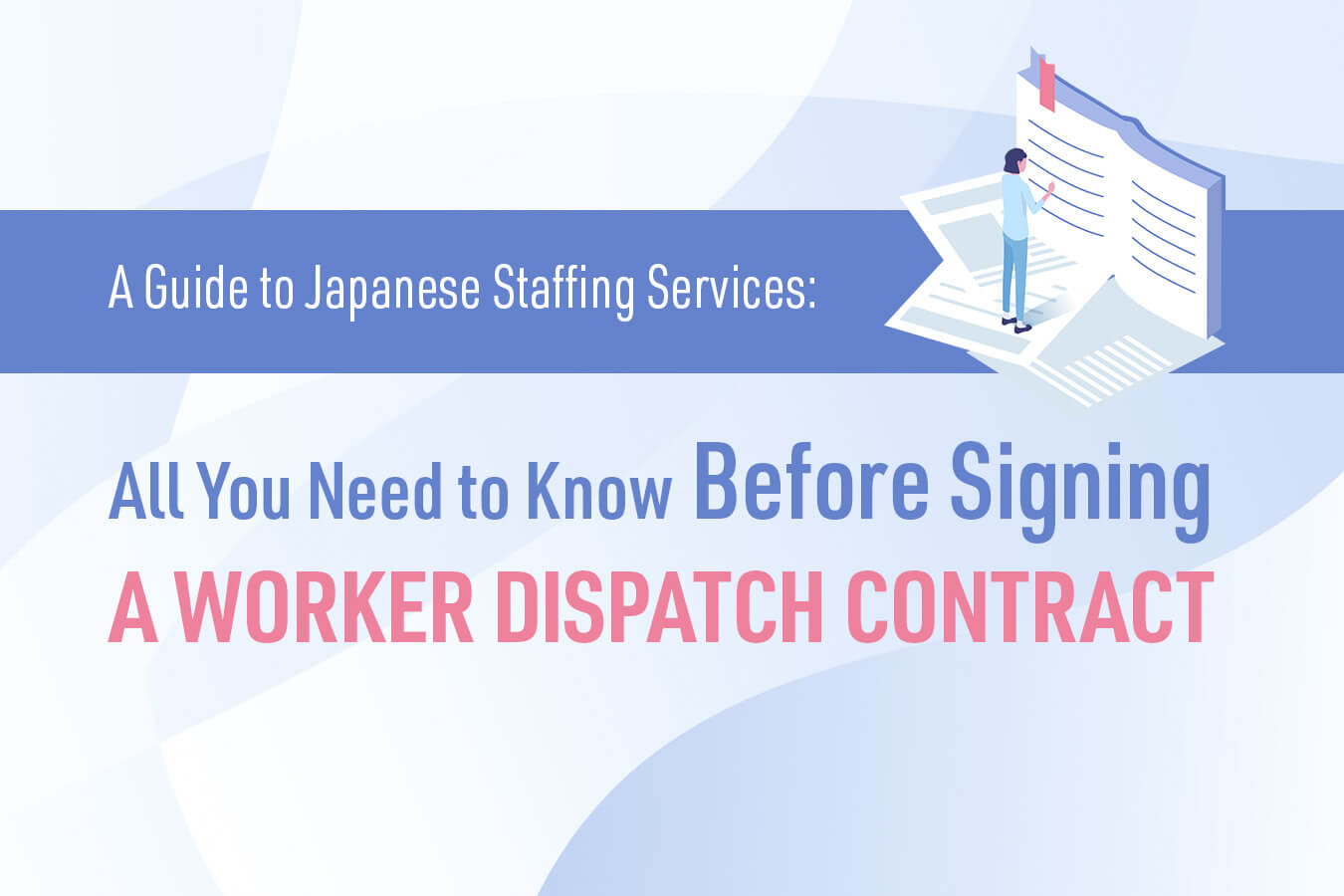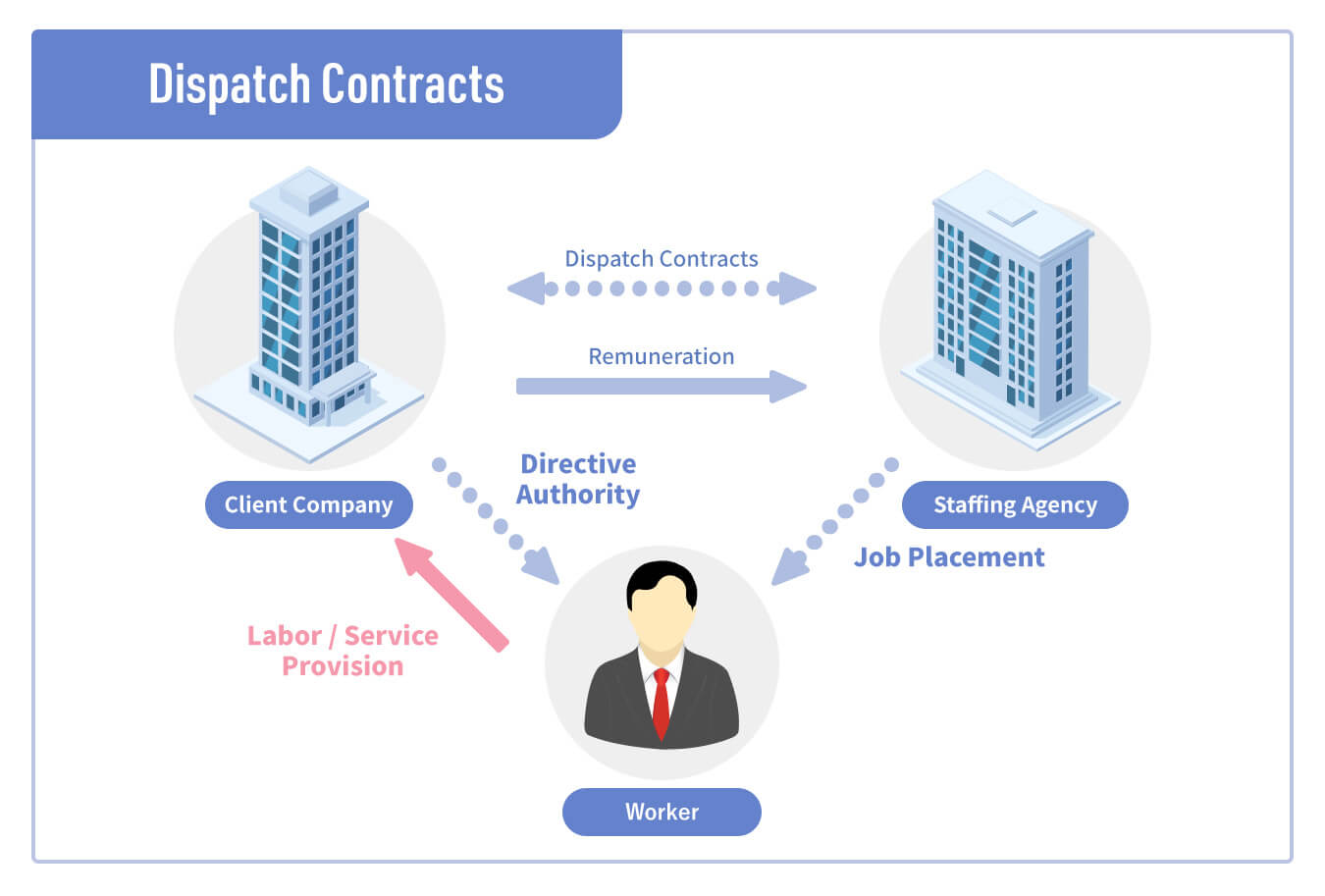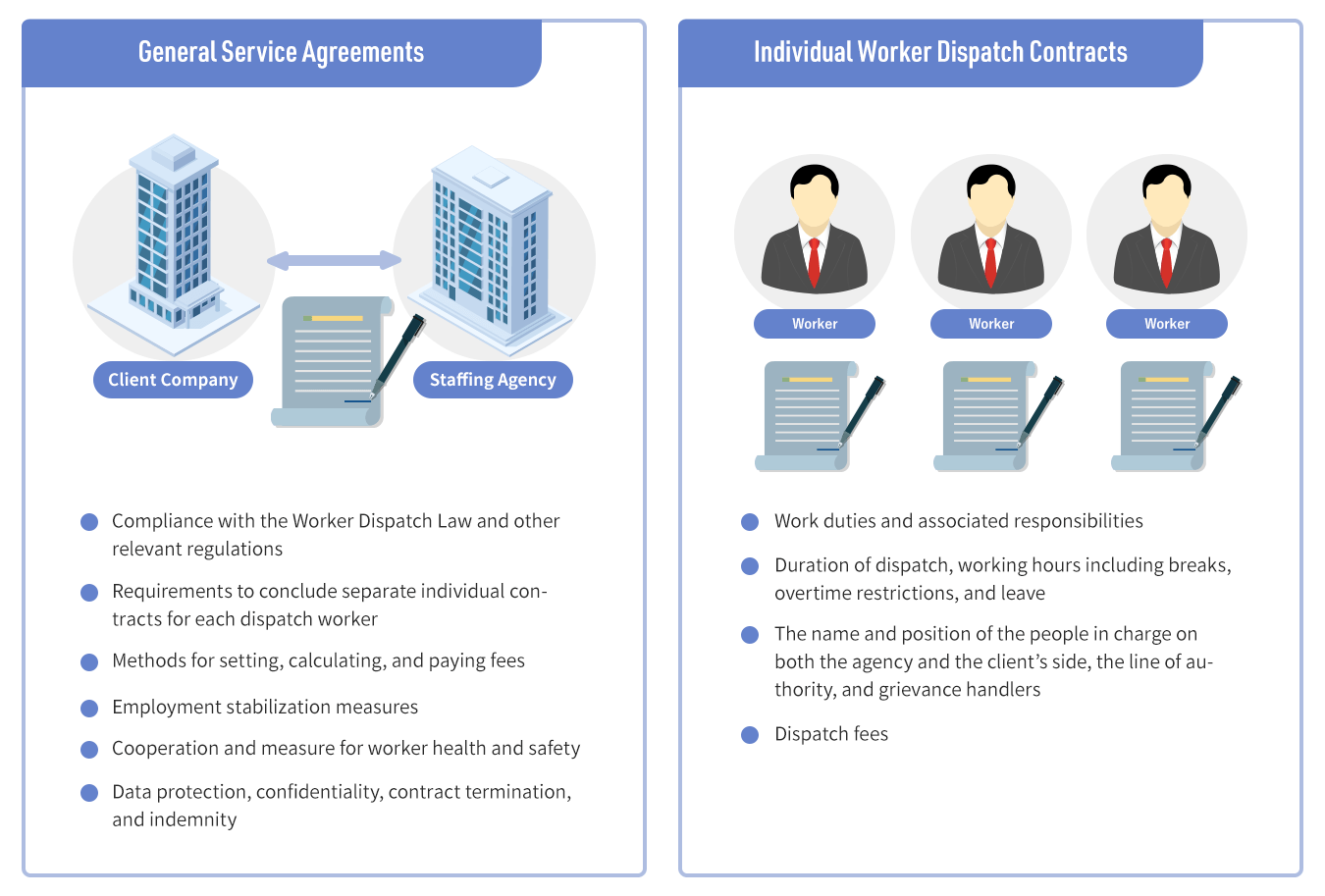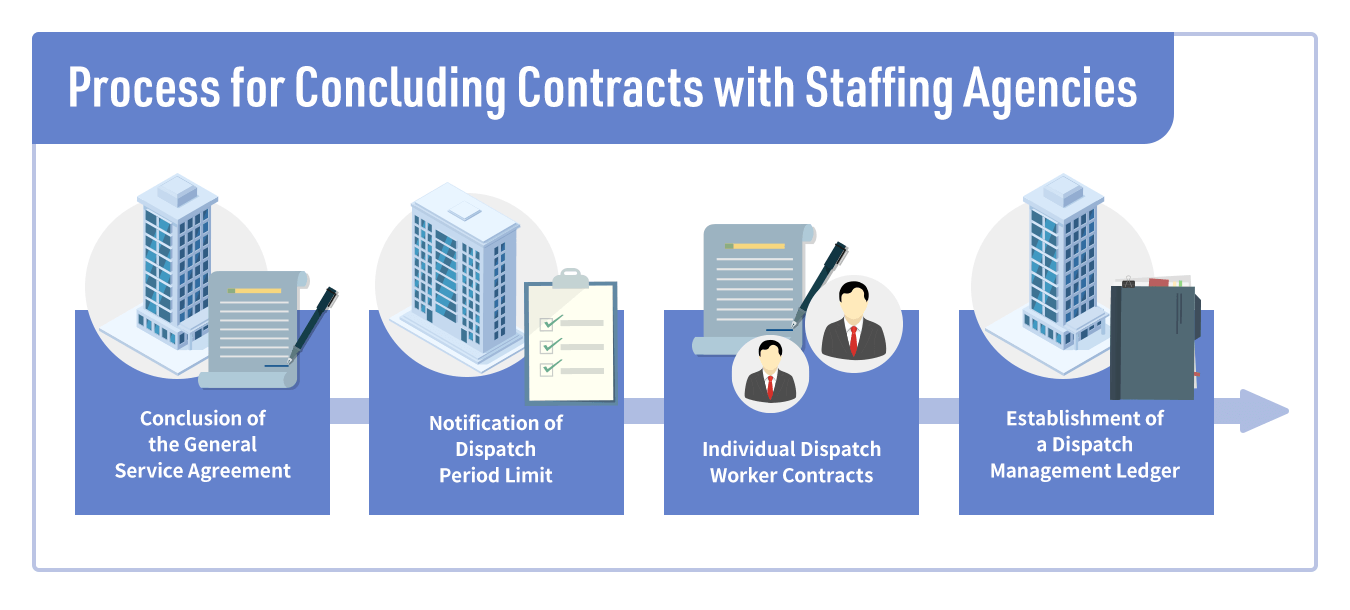A Guide to Japanese Staffing Services: All You Need to Know Before Signing a Worker Dispatch Contract
August 26, 2024

In our last article , we explained the different options available to companies wishing to use Japanese staffing services. For many, haken or worker dispatch is the best option, yet a lot of foreign companies using these services for the first time, find the basic structure and rules confusing. This article explains the essential points that you need to be aware of when concluding a worker dispatch contract, along the details that should be included and the overall process for signing a contract.
Table of Contents
- Dispatch Contracts: The Basics
- Contracts with Staffing Agencies
- General Service Agreements
- Common Elements of General Service Agreements:
- Individual Worker Dispatch Contracts (Individual Service Agreements)
- Common Elements of Individual Worker Dispatch Contract:
- Things to Do Before Concluding Contracts with Staffing Agencies
- Limitations on Worker Dispatch Agreements
- Process for Concluding Contracts with Staffing Agencies
- Penalties for Violating Staffing Regulations
- Conclusion
1. Dispatch Contracts: The Basics
Let’s begin by looking at the basic structure of a Japanese dispatch contract. Commonly referred to as “worker dispatch contracts”, these are agreements by which a staffing agency sends its workers to work at their clients’ companies. These workers are fully employed by the staffing agency which is responsible for paying the workers’ salaries and social benefits, and for looking after their general well being on the job.

2. Contracts with Staffing Agencies
The contracts between client companies and staffing agencies primarily comprise of two agreements: a general service agreement, and one or more individual service agreement, known as “Individual Worker Dispatch Contracts”.
3. General Service Agreements
A general service agreement sets out the general terms and conditions for using the staffing services. It includes terms related to fees and payment structures, the scope of the services, legal compliance requirements and contract duration. While not legally mandated, general service agreements are typically signed to avoid misunderstandings and to mitigate risks.
4. Common Elements of General Service Agreements:
- Compliance with the Worker Dispatch Law and other relevant regulations
- Requirements to conclude separate individual contracts for each dispatch worker
- Methods for setting, calculating, and paying fees
- Employment stabilization measures
- Cooperation and measure for worker health and safety
- Data protection, confidentiality, contract termination, and indemnity
General Service Agreements often have a term of one year with automatic renewal.
5. Individual Worker Dispatch Contracts (Individual Service Agreements)
Individual worker Dispatch Contracts are signed for each temporary worker dispatched to a company. They detail specific job duties, working hours, duration, and fees. These contracts are legally required under the Worker Dispatch Law whenever staffing services are utilized.
6. Common Elements of Individual Worker Dispatch Contract:
- Work duties and associated responsibilities
- The name and location of the worksite and organizational unit
- Duration of dispatch, working hours including breaks, overtime restrictions, and leave
- The name and position of the people in charge on both the agency and the client’s side, the line of authority, and grievance handlers
- Dispatch fees
When summarized in a diagram, the relationship between General Service Agreement and the Individual Worker Dispatch Contract looks like this:

7. Things to Do Before Concluding Contracts with Staffing Agencies
7-1. Check the Agency is Licensed
Before entering into a dispatch agreement, it is important to ensure the agency that you are dealing with has the necessary authorization from the Ministry of Health, Labour and Welfare to provide the services. Worker dispatch is highly regulated and agencies must have a license to provide services. Most reputable companies will display their license information on their websites and marketing materials. If it is not there, ask the company about it.
Failure to do this may result in penalties and disruption to your business.
7-2. Clearly Define the Scope of Work
Dispatch contracts should clearly outline the tasks the temporary worker will perform. Under the law regulating worker dispatch, tasks not specified in the Individual Worker Dispatch Contract cannot be assigned to the worker, so it’s crucial to be thorough when drafting the agreement.
7-3. Check for Unfavorable Terms
When signing a temporary staffing contract, check every detail of the contract to make sure that it does not contain any clauses that are disadvantageous to your company. Provisions to look for include:
Terms limiting liability for damages to the clients business.
Terms limiting the scope of damages. If the scope of damages is limited, there is a risk that the client will not be adequately compensated should a problem occur.
Excessively high or low compensation amounts for damages may place an excessive burden on the client or, conversely, may prevent the client from receiving adequate compensation.
8. Limitations on Worker Dispatch Agreements
Certain types of work fall outside those permitted by the Worker Dispatch Law and, therefore, cannot be carried out by temporary workers under an Individual Dispatch Worker Contract.
These include:
- Dock work: Loading/unloading ships, barge transportation, etc.
- Construction work: Civil engineering, building, renovation, repair, demolition, etc.
- Security: Dispatch workers are prohibited from working as security guards at offices, entertainment venues, residences, parking lots, etc.
- Medical work: Doctors, dentists, pharmacists, nurses, midwives, etc.
8-1. The “3-Year Rule”
The “3-Year Rule” limits the time a temporary worker can be employed in the same position at a client company. This rule aims to ensure job stability for temporary workers. If this period is exceeded, the client company must either hire the worker as its permanent employee or replace them with a new temporary worker.
8-2. Worker Selection
While client companies can specify the skills and expertise they require from a dispatch worker, under the law it is prohibited for them to be involved in, or influence the recruitment of workers by staffing agencies (the workers who will be dispatched to the client), nor can they select which workers are ultimately dispatched to them. This provision is designed to promote fair employment opportunities and prevent discriminatory employment practices.
8-3. Prohibition on Assigning Non-Contracted Tasks
As mentioned earlier, temporary workers cannot be asked to perform tasks that are not specified in the Individual Worker Dispatch Contract. If circumstances change and the client company requires the worker to perform tasks not covered by the contract, they must talk to the staffing agency and the contract must be amended.
8-4. Mid-Contract Termination
Mid-contract termination of staffing agreements by client companies is generally prohibited. Early termination is possible in exceptional circumstances; however, under the law, the client company is obliged to make all reasonable efforts to find alternative employment opportunities for the temporary worker or workers affected by the termination.
9. Process for Concluding Contracts with Staffing Agencies
The general steps for concluding contracts with staffing agencies are as follows:

- Conclusion of the General Service Agreement: Agree the fundamental terms and conditions to avoid misunderstandings.
- Notification of Dispatch Period Limit: The staffing agency will notify the client company of the dispatch period limit based on the 3-Year Rule.
- Individual Dispatch Worker Contracts: Individual contracts with the staffing agency for each temporary worker specifying job details and conditions are created and signed.
- Establishment of a Dispatch Management Ledger: Companies accepting temporary staff are obliged to prepare a Dispatch Management Ledger. This records the working hours and duties of each temporary staff member, as well as the dates and details of any complaints received and training provided.
10. Penalties for Violating Staffing Regulations
If a client company violates the Dispatched Workers Law, the government regulator will first issue guidance and advice. If the violations continue, a recommendation for correction will be issued. Eventually, if violations are not corrected, the name of the company will be published by the government regulator damaging the company’s credibility.
For serious violations of the law by a staffing agency, a business improvement order or business suspension order will be issued, and eventually the labor dispatch business license will be revoked.
11. Conclusion
Worker dispatch contracts offer several advantages compared to other staffing options:
- Quick and Flexible Staff Acquisition: Dispatch staffing can swiftly fill gaps resulting from sudden departures, long-term absences, or peak periods. By specifying the required skills and duration, companies can bypass the complex recruitment processes and hire skilled workers quickly. This flexibility helps adjust workforce levels according to workload variations.
- Access to Specialized Knowledge: For projects requiring specific expertise that internal resources lack, staffing services can provide people with the expertise and skills required.
- Reduced Labor Management Burden: Staffing agencies handle the workers’ payroll, social insurance procedures, and benefits management, easing the administrative load on the client company.
- Minimized Employment Risks: Dispatch services often result in temporary staff becoming permanent employees at the client company. This is because the client company can evaluate a worker’s performance and fit while they are working as a dispatch worker and can choose whether to offer them a permanent position, reducing the risk of hiring mismatches.
When using dispatch staffing services, there are many points to consider and factors to be wary of. However, for most companies using dispatch workers is a very positive experience which can give business an important boost.
For Reliable and Experienced IT Infrastructure Staffing, Choose ISFNET
If you are facing IT infrastructure staffing challenges, consider ISF NET’s IT infrastructure engineer dispatch service.
With over 20 years of specialized experience and partnerships with more than 2,000 companies across Japan, we offer comprehensive solutions from proposal to contract conclusion and post-implementation support, all in English.
- On-site Support in Japan:On-site Services
- Remote Support from Japan to Overseas:Global Offshore Solutions
Return to the page of Managed Service of the bilingual help desk and onsite | ISF NET, INC.